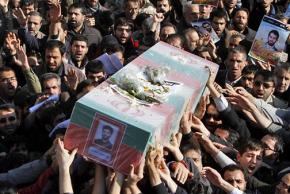Who is killing Iran’s scientists?
Evidence of a campaign of international terrorism involving Iran is undeniable--only Iran is the victim, and the likely culprits are Israel and the U.S. reports.
ANOTHER SCIENTIST has been murdered in Iran as part of a terrorist campaign targeting the country's nuclear program.
U.S. officials deny it, but the killings have the fingerprints of Washington and especially its devoted ally Israel all over them. "Does anyone doubt that some combination of the two nations completely obsessed with Iran's nuclear program--Israel and the U.S.--are responsible?" Salon.com's Glenn Greenwald asked rhetorically.
The 32-year-old Mostafa Ahmadi Roshan was killed by a car bomb on January 11, along with his driver. According to witnesses, two men on a motorcycle pulled up alongside Roshan's car and apparently attached a magnetic bomb to it--the device detonated seconds later. According to one report, Roshan, the deputy director of the country's uranium enrichment facility, was on his way to a ceremony to commemorate the second anniversary of the killing of another nuclear physicist, Massoud Ali Mohammadi.
In the two years between the killings of Mohammadi and Roshan, two other Iranian scientists have been assassinated and another injured in what the Israeli newspaper Haaretz snidely referred to as "[m]ysterious deaths and blasts linked to Iran's nuclear program."

Untargeted explosions--18 last year, according to National Public Radio--at sites allegedly associated with the nuclear program have claimed even more lives. In the most recent, seven people were killed in a blast last month at a steel mill in the city of Yazd.
The murders have been indiscriminate in other ways, too. Mohammadi, for example, was known to be a supporter of Mir Hussein Moussavi, the reformist political leader who ran for president in 2009 against the representative of Iran's ruling conservative elite, Mahmoud Ahmadinejad.
FOR THE record, U.S. officials deny that their forces have anything to do with the killings in Iran. But the Israeli government has all but admitted its part.
At the end of July, when he was asked if his country was involved in the assassinations, Israeli Defense Minister Ehud Barak answered, "Israel is not responding"--but reporters noted the "smile on his face" as he said it. The German news magazine Der Spiegel later quoted an anonymous Israeli intelligence official attributing the murders to the spy agency Mossad.
Less than 24 hours before Roshan's murder, Benny Gantz, chief of staff of the Israel Defense Forces, told a committee of Israel's Knesset that Iran would face "continuing and growing pressure from the international community and things which take place in an unnatural manner."
If anyone is tempted to believe that Israel acted alone, against the wishes of the U.S., they should remember that the CIA is known to have targeted Iranian scientists in the past to recruit them as spies. According to one, Shahram Amiri, U.S. agents kidnapped him in an attempt get him to go along with their plans.
The latest murder comes as tensions have ramped up between Iran and the West.
The U.S. and its allies claim an International Atomic Energy Administration report issued in December contains evidence that Iran's nuclear program is aimed at building a nuclear weapon. The report doesn't say this at all--but this served as an excuse for the U.S. and Europe to push new economic sanctions. Iran responded at the end of December with a military display of force and threats that it could close the Strait of Hormuz, the entrance point to the Persian Gulf.
U.S. officials say Iran would be crossing a "red line" if, in the future, it attempts to close the shipping lanes. But there hasn't been anywhere near the same frenzy about an assassination campaign that is underway right now in Iran--and has been for several years.
On the contrary, some U.S. political leaders think Washington should be proud to claim involvement in the killings. Last October, Rick Santorum--now the leading contender among the Republican right for the GOP presidential nomination--declared:
On occasion, scientists working on the nuclear program in Iran turn up dead. I think that's a wonderful thing, candidly...I think we should send a very clear message that if you are a scientist from Russia, North Korea, or from Iran, and you are going to work on a nuclear program to develop a bomb for Iran, you are not safe.
Actually, Santorum is refreshingly honest about what is taking place in Iran--a campaign of murder designed to terrorize anyone connected with the country's nuclear program, in whatever capacity.
But terrorism is one word you won't find in the mainstream media's description of the assassinations.
By contrast, when the U.S. Department of Justice announced indictments in a fantastical plot--allegedly masterminded by Iran's Revolutionary Guard and organized by a failed Texas used-car salesman, with help from a Mexican drug cartel--to murder Saudi Arabia's ambassador to the U.S., Attorney General Eric Holder claimed the Feds had foiled "an act of international terrorism." The corporate media repeated both his characterization and ludicrous allegations as established facts.
The double standards are glaring--and sickening. As Glenn Greenwald wrote:
Does anyone have any doubt whatsoever that if Iran were sending hit squads to kill Israeli scientists in Tel Aviv, or was murdering a series of American scientists at Los Alamos (while wounding several of their wives, including, in one instance, shooting them in front of their child's kindergarten), that those acts would be universally denounced as terrorism, and the only debate would be whether the retaliation should be nuclear, carpet-bombing or invasion?
As always, terrorism is the most meaningless--and thus most manipulated--term of propaganda; it's always what They do and never what We do.


